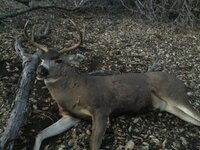Bubblehide
WKR
- Joined
- May 13, 2015
- Messages
- 4,154
Yeah, that is old school thought process; old beliefs can be very difficult to let go of for many.If the herd in question has the genetic potential for large, multi-branched antlers with eyeguards/browtines then this would be correct. Without the underlying genetic makeup, you'd still have bucks with smaller antlers, and fewer tines/points. Genotype vs phenotype.
Not that points are everything. I'd take a mature heavy 2x2 with good mass and height over a spindly young 4x4, but that's just my preference. To each their own.

